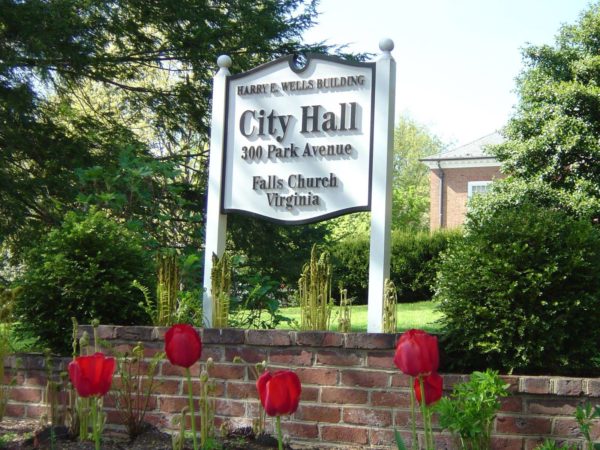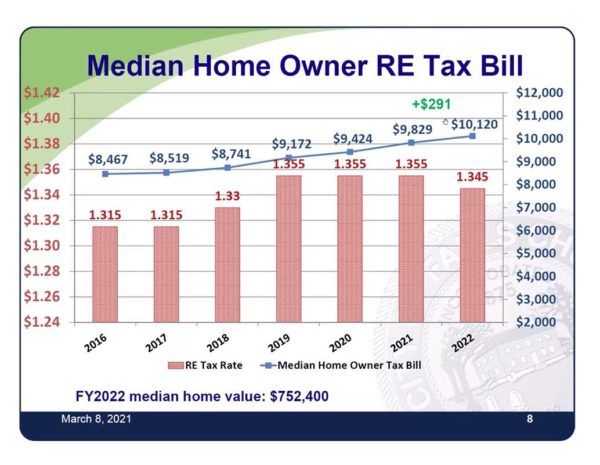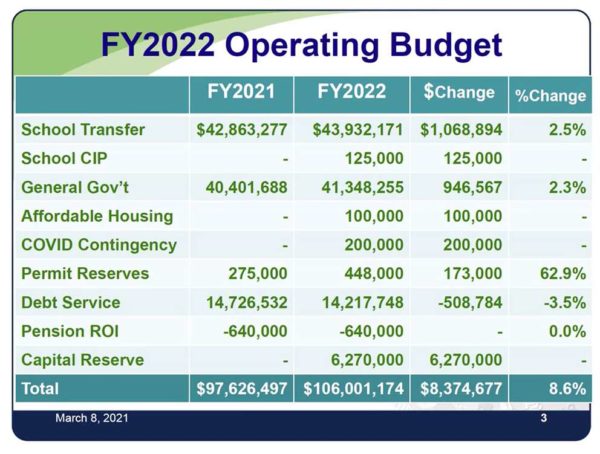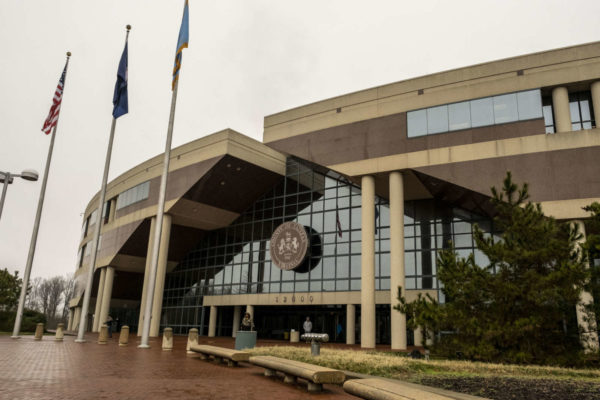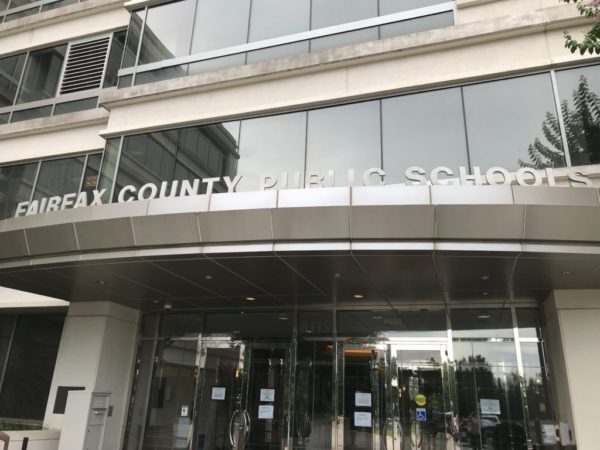Virginia Extends Tax Deadline — Gov. Ralph Northam announced on Friday (March 19) that the state taxation department will extend deadline for filing and paying individual income taxes from May 1 to May 17. The move came shortly after the IRS and Treasury Department pushed the deadline for federal income tax filings and payments from April 15 to May 17. [Virginia Governor’s Office]
Bicycling Still Hazardous in Tysons, Study Finds — A market study commissioned by the Tysons Partnership found a lack of the protected bicycle lanes and connections between neighborhoods and streets needed to make the area friendlier to cyclists. Nearly 10 miles of road in Tysons rank in the Fairfax County Department of Transportation’s most dangerous category, compared to just two miles receiving the highest bikeability rating. [Greater Greater Washington]
Vienna Police Arrest Man Suspected of Burglary — The Vienna Police Department arrested a 58-year-old man on March 15 after receiving calls about a man “pulling on doors, possibly trying to enter businesses in the area” and later entering a resident’s home while they were sleeping. Police are looking for assistance in identifying jewelry and other property that the man allegedly stole. [Vienna Police Department]
CDC Updates Social Distancing Guidance for Schools to Three Feet — “Fairfax Superintendent Scott Brabrand said Friday in a message to parents that the new guidance was “very encouraging,” but under review. He said he will meet with principals and county health officials next week to work on the issue.” [The Washington Post]
Dranesville District Budget Town Hall Tonight — Dranesville District Supervisor John Foust is holding a virtual town hall at 7 p.m. to discuss Fairfax County’s proposed fiscal year 2022 budget. The meeting will be televised on Channel 16, streamed online, and streamed live on Foust’s Facebook page. [Supervisor John Foust/Facebook]
Cases over Bijan Ghaisar’s Death Stall in Court — A federal judge assigned to oversee a criminal case and civil lawsuit against U.S. Park Police officers for the 2017 fatal shooting of McLean resident Bijan Ghaisar “has made no moves to hold any hearings on the cases or provide a pretrial briefing and discovery schedule.” The officers were indicted by a Fairfax County grand jury in October but are seeking to have the cases moved to federal court. [The Washington Post]
Statewide Tornado Drill Scheduled for Today — Virginia will conduct a tornado drill at 9:45 a.m. today (Tuesday) as part of its first-ever Virginia Severe Weather Awareness Week, which started yesterday and will last through March 19. The alert will be issued through NOAA Weather Radio stations as well as local radio, TV, and cable outlets. [Fairfax County Emergency Information]
Falls Church City Council Gives Initial Approval to New Noise Ordinance — The city council voted 7-0 to give a preliminary “OK” to a measure that would permit up to 75 decibels of sound up to 10:30 p.m. in business and industrial areas on Friday and Saturday nights. Dates for a public hearing and final approval have not yet been scheduled. [Falls Church News-Press]
Fairfax County Chairman Criticizes Proposed Metro Cuts — Board of Supervisors Chairman Jeff McKay says that Metro’s proposed fiscal year 2022 budget would be “frustrating and could be harmful in both the short- and long-term to Metro and our Northern Virginia economy,” especially in Tysons. Federal relief funds are expected to stave off the cuts, but they have not been officially taken off the table yet. The public comment period ends today at 5 p.m. [Inside NoVA]
James Madison High School Kicks off Renovation — “We have officially kicked off renovation season! Fencing was installed in our main parking lot today. Changed traffic patterns and relocated parking spaces are just the start of what spring will bring us!” [@JamesMadisonHS/Twitter]
McLean Private School Rallies Support for Food Drive — Students, parents, faculty, and staff at The Langley School all chipped in for a three-week food drive to support the D.C. nonprofit So Others Might Eat. The effort produced more than $5,000 in monetary contributions and more than 2,000 donated non-perishable food items. [Sun Gazette]
Some big changes are coming to McLean, and Dranesville Supervisor John Foust says he supports many — but not all — of them.
During a “Good Morning, McLean” breakfast hosted by the Greater McLean Chamber of Commerce yesterday morning (Thursday), Foust highlighted ongoing redevelopment work to the downtown area and Chain Bridge Road, but expressed caution about proposed zoning changes.
He repeated his support for the McLean Commercial Business Center revitalization plan despite some vocal opposition, saying it encourages development while protecting those who do not want McLean to become the next Tysons. The Fairfax County Planning Commission will hold a public hearing on the plan on April 28, and it will go before the Board of Supervisors on May 18.
Foust also spoke favorably about Tri-State Development’s proposal to build a 35-unit senior living facility with townhouses on a Chain Bridge Road site that would otherwise fit nine single-family homes. Earlier this month, the planning commission deferred a decision on the plan until next Wednesday (March 17).
“It’s exactly what McLean residents are looking for who want to downsize but don’t want to leave McLean,” Foust said. “Fundamentally, it’s a good application, and I think it’ll probably get approved.”
The project has received some pushback from nearby residents who say the project extends the business district into their residential area and will cause transportation and parking problems.
Foust acknowledged these complaints, adding that a dedicated left turn lane at the Chain Bridge and Davidson Road intersection could be needed to account for car and foot traffic. Ultimately, though, he believes it is better than the alternative for developers.
“Building nine houses would’ve been miserable,” he said.
McLean is also bracing for the potential impact of Fairfax County’s Zoning Ordinance Modernization project. Most of the changes proposed by county staff are “non-controversial” and will simplify frustrating ordinances, Foust said.
But he opposes a few elements that have also consternated the public, including proposed regulations on flags and changes to the permits required to operate a business from home.
Foust says loosening customer and signage rules for home-based businesses could lead to more businesses in residential areas.
“Staff prepared, I think, a very liberalized version,” he said. “I’m not excited about the direction staff is trying to take this.”
Outside of development and zoning issues, Foust says that, as chair of the Board of Supervisors’ economic initiatives committee, he has been focused on how Fairfax County will recover from the COVID-19 pandemic once it’s over.
The committee will receive a presentation on Tuesday from a consultant that the county hired last year to develop recommendations for its road to recovery. Right now, about $15 million are earmarked for implementing recovery programs, but Foust predicts “that number will increase dramatically” when Fairfax County receives federal funding through the American Rescue Plan Act.
According to Fairfax County, that sum could be $222.56 million, although the exact amount has not yet been confirmed by the federal government.
In the meantime, the vaccine process is picking up, even with more than 103,000 people currently on Fairfax County’s waitlist.
“We’re getting through it,” Foust said. “…I get so frustrated sometimes with the failures we’ve encountered, the bumps in the road, but when I step back and look at what staff and others are accomplishing, it’s just amazing.”
Staff photo by Jay Westcott
Following in the footsteps of his Fairfax County counterpart, Falls Church City Manager Wyatt Shields is proposing a one-cent reduction in the real estate tax rate as part of the city’s advertised fiscal year 2022 budget.
However, because of rising assessed values, the average homeowner will still experience a $291 increase in their tax bill next year.
Presented to the city council on Monday (March 8), the advertised budget increases city government operating expenses by 2.3% (or $946,567) and public schools funding by 2.5% (or just over $1 million).
“With vaccines rolling out, and springtime in the air, we need to maintain vigilance but certainly have optimism toward the future — and hopefully, this budget reflects that as well,” Shields said.
Falls Church City School Board Chair Shannon Litton called the proposed $1 million funding increase for FCCPS “a bit better than we expected, given COVID-19.” The school division will also be receiving an additional $20,000 from the state and $31,000 from the federal government, she said.
Shields said the budget keeps revenues in line with forecasts from December without proposing a larger increase on residential real estate taxpayers. The city saw year-over-year increases in taxes on groceries and online sales, but a large decrease in revenue from hospitality taxes.
Highlights of the budget include funding for:
- $145,000 for body-worn cameras and civilian positions to support the department, which is a first step in addressing recommendations from the Use of Force Review Committee
- $200,000 in coronavirus contingency funds to address uncertainties, either revenue shortfalls or increased demand for services and assistance
- $150,000 to develop a Parks Master Plan
- $100,000 for the Affordable Housing Fund to supplement the $3.75 million Amazon REACH grant funds and leverage future developer contributions.
Shields has also proposed increasing stormwater management rates by 2%, or $4, for a median homeowner to pay for projects intended to address smaller-scale nuisance flooding. He anticipates that the city will need to increase rates by 10 to 15% for the next five years to fund six larger-scale stormwater management projects.
The advertised budget gives Falls Church City employees a 3% merit compensation increase, and a 3.5% step increase to uniformed police staff, but Shields told the city council on Monday that this small-scale growth is not sustainable in the long-term.
“My budget guidance for six years in a row was to keep non-personnel expenses flat,” he said. “So, it is really important to emphasize that after six years in a row of doing that — in addition to cuts made last year due to COVID-19 — our budgets are extremely lean.”
The city has about $3.94 million in unfunded needs across all departments, he said. These range from adding positions, including police officers, IT staff, and economic development staff, to maintaining public amenities, such as basketball and tennis courts and athletic fields.
Other highlights include:
- A $500,000 decrease in debt service, as due to the cancellation of planned debt issuance during the current fiscal year and refunding prior bonds from 2013 and 2011 at lower interest rates.
- A $4.5 million transfer from the 10-acre land at the George Mason High School campus to capital reserves.
- Anticipated concessions from Founders Row for $1.8 million, which will also be placed in capital reserves.
In addition to flood mitigation, other public safety spending includes investments in sidewalks, paving — which Shields said has been underfunded since the Great Recession — and neighborhood traffic calming activities. State grants will pay for improvements to the Park Avenue “Great Streets” project, the Oak Street Bridge and the Washington and Columbia intersection.
The city will also receive funding through the Biden administration’s American Recovery Act.
“That congressional aid [is] needed and necessary, and we will use it very well for infrastructure and capital needs,” Shields said.
Community members will get a chance to learn about the budget and share their comments at a town hall from noon to 1:30 p.m. on Thursday (March 11). Budget meetings will be held on March 22 and April 12, and there will be a second town hall on April 15 before the city council is slated to adopt the budget on April 26.
Photo via City of Falls Church Government/Facebook, charts via City of Falls Church
Public Hearings on Metro Budget Begin Today — The Metro Board of Directors is holding virtual public hearings this week on the transit agency’s proposed FY 2022 budget, which could significantly reduce rail service and close 22 stations, including the McLean station. The first meeting starts at 11 a.m. today, and the hearing scheduled for 6 p.m. on Wednesday (March 10) will focus on changes in Virginia. [WMATA]
Police Report More Commercial Burglaries in Tysons Area — Between Feb. 27 and March 4, Fairfax County police responded to burglaries at Sunoco (8030 Lee Highway), Grand Mart (6326 Arlington Blvd.), Ba Le Bakery (2822 Graham Rd.), Exxon (2081 Chain Bridge Rd.), and Macy’s (8000 Tysons Corner Center). [Fairfax County Police Department]
Inova and UVA Open New Medical Campus in Fairfax — The University of Virginia School of Medicine welcomed its first class of 36 medical students to a new campus developed in partnership with Inova Health Systems. Students will primarily train on the Inova Fairfax Medical Campus in Falls Church, but they will have opportunities to work across the nonprofit healthcare system’s facilities. [Inside NoVA]
School Board Votes to Advance Solar Panel Program — The Fairfax County School Board voted unanimously to move forward with a program to install solar panels on school buildings in an effort to reduce greenhouse gas emissions and electricity costs. Discussions are currently underway for projects at three schools, but Fairfax County’s original request for proposals included 87 sites. [Fairfax County Public Schools]
Deadline Approaching for McLean Community Center Governing Board Candidates — Petitions to become a candidate for a seat on MCC’s governing board must be submitted by 5 p.m. this Friday (March 12). There are three open seats on the board for adults and two for youth. [McLean Community Center/Twitter]
The Providence District Council will co-host a town hall for community members to learn about and discuss Fairfax County’s advertised Fiscal Year 2022 budget on Monday (Mar. 8).
Scheduled to run from 7-9 p.m., the budget town hall will feature:
- Providence District Supervisor Dalia Palchik
- School Board Providence District Representative Karl Frisch
- Fairfax County Chief Financial Officer Joe Mondoro
- Fairfax County Public Schools Department of Financial Services Assistant Superintendent Leigh Burden
- Providence District Council Jeff Agnew
The meeting will be streamed live online and on TV through Fairfax County’s Cable Channel 16. It will also be live-streamed on Palchik’s Facebook page.
Community members can email questions in advance to [email protected], or submit queries during the event by using the Facebook Live chat or calling a phone number that will be provided the day of the town hall.
Fairfax County will hold town halls throughout March to get public input on the county government and FCPS budgets for the next fiscal year, which starts on July 1.
The McLean Citizens Association already hosted a budget meeting on Monday (Mar. 1), but the Dranesville District will also get a live-streamed town hall at 7 p.m. on Mar. 22. For Vienna residents, the Hunter Mill District town hall will take place on WebEx and YouTube from 7-9 p.m. on Mar. 29.
The Fairfax County Board of Supervisors will also hold public hearings on the advertised budget on Apr. 13-15 before marking it up on Apr. 27 and adopting a budget on May 4.
The Fairfax County School Board, which approved an advertised budget for the public school system on Feb. 18, will hold public hearings on May 11 and, if needed, May 12 after the county’s budget is adopted.
Released on Feb. 23, County Executive Bryan Hill’s advertised budget proposes a one-cent decrease in the county’s real estate tax rate but largely holds back on new spending. The Board of Supervisors will determine an advertised tax rate, which can be equal to or lower than the final adopted one, on Tuesday (Mar. 9).
Palchik says the drastic impact of the COVID-19 pandemic on all aspects of life, including public health, education, mental health, equity, and the economy, makes it especially important for the public to share its thoughts during the budget process this year.
“In the Providence District, where we have an almost equal split between residential and commercial real estate, we saw a decrease in the commercial assessments with the increases in residential rates,” Palchik said. “Your voice is critical in helping us fully understand the needs of our entire community before the budget is finalized.”
Photo via Google Maps
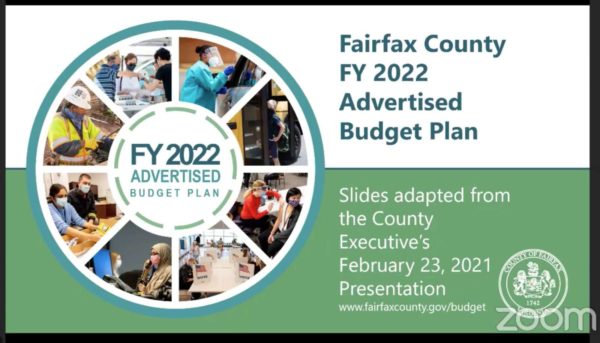
The time for community members to weigh in on Fairfax County’s FY 2022 advertised budget has arrived.
The McLean Citizens Association hosted a public meeting on Monday (Mar. 1) so residents could discuss the proposed budget with Fairfax County Chief Financial Officer Joe Mondoro and Dranesville District Supervisor John Foust.
Mondoro kicked off the meeting by discussing highlights of the budget, including the county executive’s recommendation to decrease the real estate tax rate by one cent and building on the $200.2 million the county received through the CARES Act Coronavirus Relief Fund.
During the question-and-answer portion of the meeting, attendees asked if the value of commercial properties could change as leases end and some businesses migrate to smaller workspaces.
“We’re on the edge of a pretty significant paradigm shift in terms of the ways people think about office space,” Mondoro said, adding that the office and retail component of the budget is going to need to be evaluated on an ongoing basis.
While anticipating that the value of the properties will continue to decline, he offered a bit of optimism that a balance of teleworking and in-person work will be found in coming years that could help improve the value of office space.
Mondoro also said that all markets in the area are down and “the negativity is pretty much across the board” in terms of decreases in non-residential revenue.
“There are still differences based on where the buildings are located,” Mondoro said. “Those that are more appealing in non-pandemic years are more appealing now.”
Foust argued that, while Fairfax County should focus on building up its commercial base, it also needs to reduce its reliance on real estate taxes as a source of revenue.
“We have a fundamental structural problem in that we rely so heavily on real estate taxes,” Foust said. “…Other revenue sources will need to be established in order to make the revenue more dependent on economic activity and economic success as opposed to owning a home for 20 years, which has appreciated significantly more than your income has increased.”
Audience questions also touched on the possible impact of existing and future federal financial aid.
Fairfax County received $200.2 million from the CARES Act after it was signed into law last March to cover expenses incurred due to COVID-19. The advertised budget does not assume additional stimulus funds, but county staff is monitoring another potential round of payments that could come from a new package currently being negotiated in Congress.
Mondoro tempered anticipation that more federal aid could be used to help lower the property tax rates or fund public services like affordable housing or schools, noting that the money is non-recurring and comes with stipulations regarding how it can be spent.
Foust reiterated Mondoro’s words of caution, though he said the county will take a look at all possibilities.
“There may be one-time charges in the budget we can pay through the federal funds,” Foust said. “Last time we were told, we were told that we cannot replace funds. Everything we spent had to be in addition to what we had previously planned to spend and could not be used to pay for things that we had previously planned to spend [on].”
Image via McLean Citizens Association
Fairfax County is considering lowering its real estate tax rate by one cent for the next fiscal year in an attempt to give relief to homeowners during the ongoing COVID-19 pandemic.
County Executive Bryan Hill presented the proposal to the Fairfax County Board of Supervisors yesterday (Tuesday) as part of an advertised Fiscal Year 2022 budget that illustrated how the pandemic has curtailed the county’s ability to fund top priorities, from education and employee pay to affordable housing and environmental initiatives.
According to Hill, the county’s residential real estate market has been “very strong” over the past year with 88% of residential properties seeing an increase in assessed value, but that also places a greater burden on homeowners at a time when unemployment is up and many people are struggling to pay their bills.
Noting that upticks have been highest for properties that typically house lower-income residents, like townhomes and condos, Hill says that, with no change to the rate, the average tax bill would increase by almost $285 for the coming year. Lowering the rate by a cent to $1.14 per $100 of assessed value would bring the average increase closer to $224.
“Homeowners have struggled due to a loss of income during the pandemic,” Board of Supervisors Chairman Jeff McKay said. “I appreciate that the County Executive has created a budget that reflects these uncertain financial times. Next year’s proposed budget does not meet every community need, but shows our commitment to preserving County programs and working to protect our residents in these uncertain times.”
The proposed tax rate decrease was coupled with an overall conservative approach to the advertised budget, which freezes pay increases for county employees for the second consecutive year and funds only a fraction of Fairfax County Public Schools’ request.
The Fairfax County School Board sought an additional $104.4 million from the county, primarily to cover a proposed 3% pay raise for all FCPS employees, but Hill’s advertised budget increases the county’s transfer by only $14.1 million.
During a press conference following the budget presentation, education advocates in the Invest in Fairfax Coalition — a grassroots organization comprised of county employee groups, residents, and other community members — urged the Board of Supervisors to give the school system more funds to pay workers and provide mental health services for students, among other needs.
“We’re very disappointed with the county executive’s proposed budget and its failure to prioritize schools,” Fairfax County Federation of Teachers President Tina Williams said. “To help students and staff recover from this pandemic, we urge this county to adopt a budget that keeps our community whole and opens our schools safely.” Read More
The Fairfax County School Board unanimously adopted an advertised Fiscal Year 2022 budget for the county public school system when it met last Thursday (Feb. 18).
The $3.2 billion budget includes a $60.3 million increase in Fairfax County Public Schools’ request for funding from the county board of supervisors to increase employee compensation rates by 3%, a significant change from what FCPS Superintendent Scott Brabrand proposed in January.
Anticipating a tough financial year due to the continued impacts of the COVID-19 pandemic, Brabrand had originally proposed freezing staff salaries aside from $3 million to complete a three-year push to bring the salaries of instructional assistants and public health training assistants up to 50% of the salary scale for teachers who have bachelor’s degrees.
Improving employee compensation has been a priority of the school board in recent years, as the board seeks to restore over $70 million and nearly 2,700 positions that have been cut since 2008, according to Lee District Representative Tamara Derenak-Kaufax.
“As a board, we must be committed to making certain we are hiring and retaining the best and brightest employees to teach our children, to counsel our children, to transport our children, to feed our children, and to ensure that their social and emotional needs are being met,” Derenak-Kaufax said. “In order to do so, we must be competitive with our surrounding jurisdictions.”
On top of the requested county transfer funds, FCPS projects that it could receive an additional $13.4 million in state revenue to cover the compensation increases based on a proposed budget from the Virginia State Senate that would provide a 3% salary bump for public school educators.
When approving the advertised budget, the school board also amended Brabrand’s proposed budget to include an additional $1.4 million to hire instructional coaches at six Title I elementary schools and create pay parity for elementary school principals and assistant principals.
Overall, the FY 2022 advertised budget seeks to increase FCPS funding by 2.4%, or $75.5 million, compared to the school system’s approved FY 2021 budget.
In addition to employee compensation, the increase provides for expanded preschool special education classes, retirement rate increases and rising health care costs, and support for student needs related to the pandemic, according to FCPS.
The budget also includes $4.9 million and 50 staff positions for English as a Second Language programs at the elementary school level, along with $500,000 and three positions for a collective bargaining team after the Virginia General Assembly passed legislation in 2020 allowing localities to recognize collective bargaining rights for public employees starting on May 1.
Karen Corbett-Sanders, who represents Mount Vernon District on the Fairfax County School Board, noted that the advertised FY 2022 budget does not include money for possible summer school programming, which will instead come from federal COVID-19 relief funds that Congress approved in December.
“We recognize that the past year has been incredibly difficult for our community,” Brabrand said. “This budget is designed to bring hope to students, their families and our staff by providing the resources each of them needs to help recognize and support all their extraordinary contributions during this pandemic.”
While not included in the advertised budget, the school board also directed Brabrand to identify funds to create positions for a neuro-diversity specialist and a trauma-informed social emotional learning specialist, roles that are, respectively, intended to provide support for students with disabilities and address students’ mental health needs.
At-large member Rachna Sizemore Heizer, who was a disability rights advocate before being elected to the school board in 2019, says having a neuro-diversity specialist could be “transformative” in helping eliminate disparities in academic achievement and discipline for students with disabilities.
“A neurodiversity-oriented approach, with its focus on student strengths, positive teacher expectations, and inclusion of the lived norms of students with disabilities within the norms of classrooms, can improve outcomes for students with disabilities and set them up for success after they leave FCPS,” Sizemore Heizer said.
County Executive Bryan Hill is scheduled to present his proposed FY 2022 budget to the Fairfax County Board of Supervisors tomorrow (Tuesday). The school board will present its advertised budget to the Board of Supervisors on Apr. 13 and adopt an approved FY 2022 budget on May 20.
(Updated at 10:35 on 2/12/2021) Fairfax County government workers whose jobs put them at high risk of exposure to COVID-19 will now receive $2,000 in hazard pay, an increase from the $1,500 that county staff initially recommended in January.
The Fairfax County Board of Supervisors unanimously approved the one-time bonuses on Tuesday (Feb. 9) before directing staff to look for additional funding to cover bonuses for all employees.
“It has been something to watch the response of our county employees over the past year to this pandemic,” Board Chairman Jeff McKay said after introducing the motion. “To be able to do this and have the resources available to reward these employees and thank them is absolutely critical.”
While the board expanded the program to include limited-term employees as well as merit employees, it backed staff’s suggestion of using the Virginia Occupational Safety and Health COVID-19 risk assessment to determine workers’ eligibility for hazard pay.
When the proposal first came to the board during its budget committee meeting on Jan. 12, some supervisors expressed concern about leaving out workers who could contract COVID-19 while on the job but don’t meet the VOSH standards for their risk level to be classified as “high” or “very high.”
The board planned to vote on hazard pay on Jan. 26, but the decision was postponed so that county staff could continue talks with the Fairfax County government employees’ union, SEIU Virginia 512, and other workers’ groups, which were advocating for hazard pay to be available to all employees.
Because the hazard pay comes from CARES Act relief funds, Fairfax County staff say federal guidelines dictate that the money must be limited to employees whose duties involve physical hardship directly related to pandemic emergency response efforts.
The approved proposal will cost an estimated $9.2 million, keeping it within the $10 million allocation that the Board of Supervisors set aside from the county’s coronavirus relief fund for hazard pay.
A broader hazard pay plan would have to use county funds, which McKay previously told Tysons Reporter would be “unlikely” to happen with the fiscal year 2022 budget. County Executive Bryan Hill will present an FY 2022 budget proposal to the board on Feb. 23.
The Board of Supervisors instead hopes to find the money for more bonuses in its FY 2021 budget through a third-quarter review that will be approved when the FY 2022 budget is marked up on Apr. 27.
“I think this is exactly the type of environment that we’re in right now that contributes to making bonuses a practical, doable solution to really value the work of all of our county employees at a time when we can’t do all of the things we’d like to do,” McKay said.
For the FY 2021 third-quarter review, staff have also been asked to evaluate the county’s leave programs and determine if new options can be provided to employees who have been unable to take advantage of existing programs due to the nature of their job.
SEIU Virginia 512 Executive Board President Tammie Wondong says the union was glad that Fairfax County ultimately included limited-term employees in its hazard pay plan, but more still needs to be done to ensure all workers are fairly compensated during the pandemic and beyond — something she argues can only be guaranteed if the union gets collective bargaining powers.
“We are headed in the right direction, because the fact is we were heard, and we got their attention,” Wondong said. “That’s the most important thing, that they heard us and they responded. It’s not fixed. We’ve still got a lot more work to do, but…now we’re able to continue to lift our voices and talk about how it continues to impact us, with the pandemic that’s going on and how people are risking their lives just to be out there.”
Staff photo by Jay Westcott





